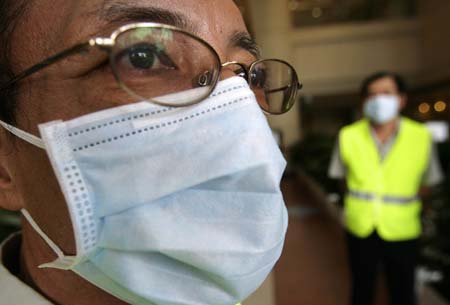Singapore reported its first death case related to flu A/H1N1 on Saturday, signaling a still worsening situation of the new flu in the Asia-Pacific region.
Prior to Singapore, Australia, New Zealand, Thailand, the Philippines and China's Hong Kong had reported deaths in connection with the new flu infection.
According to Singapore's Health Ministry, a 49-year-old man, infected with A/H1N1 flu, died of heart attack on Saturday afternoon.
The ministry said that the patient had multiple co-morbidities, including diabetes, hypertension and high cholesterol.
He was admitted to Singapore's Changi General Hospital on July 16 after four days of flu-like symptoms and was diagnosed with influenza A/H1N1.
|

|
|
Staff members wearing biomedical masks keep watch over people arriving at Tan Tock Seng hospital in Singapore May 27, 2009. [Xinhua/Reuters] |
"He died of a heart attack, contributed by severe pneumonia with underlying influenza A/H1N1 infection," the ministry said in a statement.
Singapore reported its first confirmed case of influenza A/H1N1 on May 27. On June 18, the country confirmed its first locally infected case. According to the latest official data, Singapore has confirmed over 1,200 infection cases.
Hong Kong government's Department of Health confirmed 108 new cases of influenza A/H1N1 in the past 24 hours up to 2:30 p.m. on Saturday, bringing the total number of confirmed cases to 1,748 in the city.
The new cases involved 59 males and 49 females, aged between six months and 62 years, said the department.
Currently, a total of 32 confirmed cases are staying in public hospitals for treatment. Among them, 26 cases are in stable condition, two in serious and four in critical condition.
Macao reported five newly confirmed cases of influenza A/H1N1 on Saturday, bringing the total number of such cases to 107 to date.
Four of the five newly confirmed cases were imported while the other one was locally infected, according to Macao's Health Bureau.
The locally-infected patient was a 25-year-old local man, who did not travel outside of Macao within seven days before he fell ill.
According to the statistics from the Bureau, some 20 patients that were tested positive for the A/H1N1 flu virus were still receiving medical treatments at local hospitals, while 84 others have recovered and have been discharged from the hospitals.
Indonesia has confirmed 15 people were infected with A/H1N1 flu virus, putting the total cases in the country to 157, Health Ministry said in a statement Saturday.
Of the new cases, two are foreigners and the rest are Indonesian citizens. Four of them have historical journey to Malaysia and Australia, Director General of Disease Control and Environmental Health of the ministry Tjandra Yoga Aditama said in the statement
Four of the 15 are males and 11 are females aged from 4 to 49 years, the director said. They were treated at hospitals in Jakarta, Bandung of West Java, Bali, Medan of North Sumatra and Surabaya of East Java, he said.
The virus has spread among humans in Indonesia, but so far there has been no confirmation of death from the disease in the country.
The Bangladeshi government has confirmed two more A/H1N1 flu cases, bringing the total number of the cases in the South Asian country to 24, according to local newspaper The Independent on Saturday.
The country's health authority was quoted as saying that 18 of the total 24 A/H1N1 flu patients, aged between 2 to 46, have fully recovered while six are still under medical treatment.
Ten of the cases were contracted within the country and all were relatives of those infected people who had returned from abroad.
The Bangladeshi government on June 18 confirmed the country's first A/H1N1 flu case.
(Xinhua News Agency July 20, 2009)